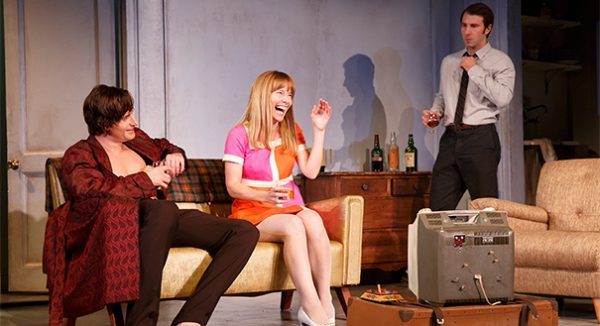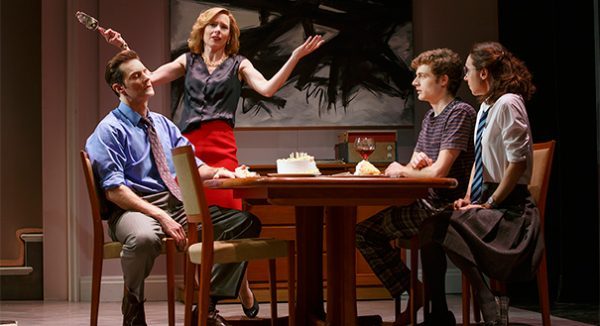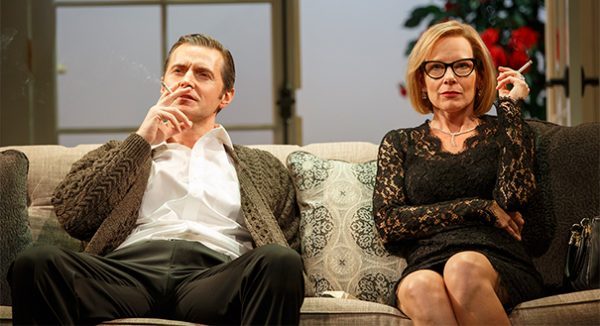
Three’s a crowd when Kenneth (Richard Armitage), Sandra (Amy Ryan), and Henry (Alex Hurt) end up hanging out in Roundabout production of LOVE, LOVE, LOVE (photo by Joan Marcus)
Laura Pels Theatre
Harold and Miriam Steinberg Center for Theatre
111 West 46th St. between Sixth & Seventh Aves.
Tuesday – Sunday through November 30, $99
212-719-1300
www.roundabouttheatre.org
Mike Bartlett follows a pair of baby boomers through three generations in the blisteringly funny black comedy Love, Love, Love. The three-act play begins on June 25, 1967, as Kenneth (Richard Armitage) is hanging out in his brother’s flat, wearing an open robe and waiting for the Beatles to appear on television. His stuffy brother, the deadly serious Henry (Alex Hurt), wants him out of the apartment because his potential new girlfriend, Sandra (Amy Ryan), is coming over for dinner for the first time. While Ken, who is nineteen, has embraced the radical sixties, his older brother is a sour, old-fashioned drag. “Nothing like this has ever happened before,” Ken says, referring to people around the world tuning in at the same time to watch the Fab Four. “The laws are constantly being overthrown, the boundaries of what’s possible, the music’s exploding, the walls collapsing. That’s what’s going on. That’s what’s changing. We travel, do what we want, wear what we like. Enjoy it. Experiment. We’re breaking free.” Henry responds, “Well, you can break free right now and bugger off. She’ll be here in a minute.” Sandra, also nineteen, arrives like a burst of grooviness, looking like a cross between Judy Carne and Goldie Hawn from Laugh-In and ready for anything, which excites Ken but confuses Henry.

Dysfunction is always on the menu when Ken (Richard Armitage), Sandra (Amy Ryan), Jamie (Ben Rosenfield), and Rose (Zoe Kazan) get together (photo by Joan Marcus)
The second act moves ahead to a well-kept living/dining room in Reading, where Ken and Sandra live with their two teenage children, Rose (Zoe Kazan), who is turning sixteen at midnight, and the slightly younger Jamie (Ben Rosenfield), who is blasting the Stone Roses as the curtain rises. Ken and Sandra have settled into their suburban, upper-middle-class lives, a far cry from the dreams they had in the sixties. “We’re boring,” Sandra says. “We are boring, that’s true,” Ken agrees. Both parents have careers, and they selfishly don’t give much time or thought to their kids, particularly Rose, who has just returned from playing the violin at a school concert and is upset that she did not see her mother in the audience. After Ken and Sandra divulge some damaging secrets to each other, the family sits down to eat Rose’s birthday cake, but everything is ruined when Sandra makes a surprise announcement, telling the kids that it’s “the only way we can be free.” The finale jumps to 2011, with “Sexy Chick” by David Guetta featuring Akon playing on an iPad in a spacious living room in a fine country house. The family has gathered together for a funeral, but Rose has come primarily to ask something important of her parents. Meanwhile, Jamie just wants to play games on his iPhone and go sunbathing. As always, Ken and Sandra don’t really understand what Rose needs; Sandra is too busy smoking and drinking — there’s a whole lot of smoking and drinking throughout the play — and Ken is enjoying his retirement. “I just can’t concentrate anymore,” he says. “No need to. I love it. Freedom! At last!” But once again, it is not the freedom he envisioned when he first met Sandra forty-four years earlier.

Ken (Richard Armitage) and Sandra (Amy Ryan) reflect on their life and family in Mike Bartlett’s sizzling three-act play (photo by Joan Marcus)
Tony-winning director Michael Mayer (Spring Awakening, Hedwig and the Angry Inch) revels in Bartlett’s (King Charles III, Cock) razor-sharp wit, injecting a nearly breathless energy throughout the two-hour show as the dialogue bounces back-and-forth among the characters like a superfast game of pinball. Derek McLane’s (Anything Goes, 33 Variations) sets and Susan Hilferty’s (Wicked, Into the Woods) costumes are spot-on, clearly announcing the changing times. Queens native and Oscar- and two-time Tony nominee Ryan (Gone Baby Gone, Uncle Vanya) is wickedly funny as the unpredictable, self-absorbed Sandra, while Armitage (The Crucible, the Hobbit trilogy), the only actual British actor in the cast, is a steady anchor as the unwavering Ken; together they make a formidable stage duo as their characters evolve and devolve. “Nowhere you can be that isn’t where you’re meant to be,” John Lennon sings in the Beatles’ “All You Need Is Love,” the refrain of which gives the play its title. There might not be a whole lotta love in this dysfunctional family, but there is a whole lot to love in this wonderful Roundabout production.